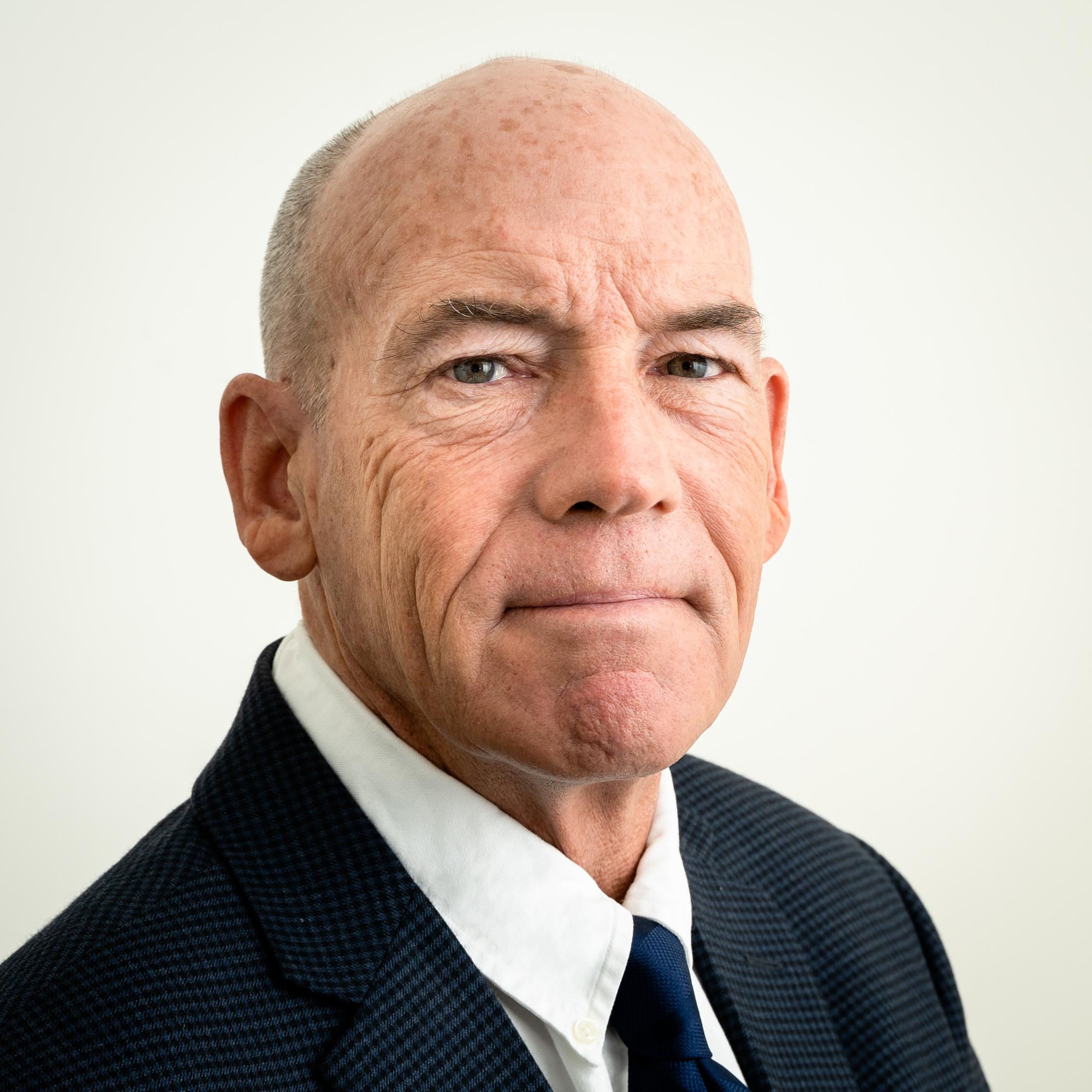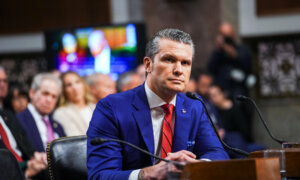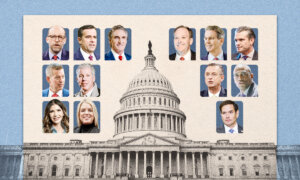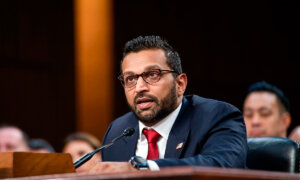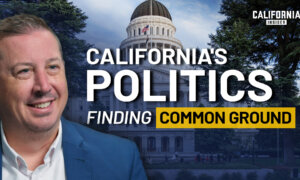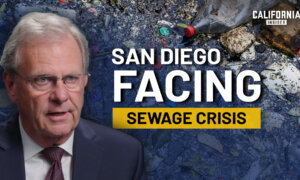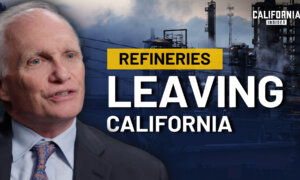“Senator, the Trump administration never had a family separation policy. They had a zero-tolerance policy, which said that our laws would be followed,” Noem replied.
The policy required the prosecution of all adults who illegally crossed the southern border, with no exceptions for asylum seekers or those accompanied by minors. One indirect result was that roughly 3,000 illegal immigrant children were separated from the adults they crossed the border with.
Noem, however, noted that more than 300,000 illegal immigrant children have gone missing after entering the country under the Biden administration.
“This administration’s lack of desire to find out where those children are, what they may be going through, is alarming to me,” she said.
Blumenthal suggested that they should “put aside” what happened in the past.
“I can’t put aside 340,000 children,” Noem said.
The senator asked again if she would commit to reunifying those families that remain separated.
Noem said that keeping families together was “critically important” to her.
“I'm concerned about Laken Riley’s family, that they no longer have her. I’m concerned about the fact that … we have people in this country that don’t know where their children are, or people in other countries who sent their children here and they’ve been lost by this administration,” she said.
“So yes, my focus will be to keep families together. We will uphold our law, and we’ll make sure that we’re doing everything we can to keep our children safe from the trafficking and the drug epidemic that’s hit this country.”
“Yes, senator,” Noem replied. “I’ll work with you to ensure that civil rights and liberties are protected and that we are not in the misinformation and disinformation space like the current DHS is.”
Paul went on to ask the South Dakota governor if she would work to root out those in her department who were involved in such indirect censorship efforts.
Noem said she looked forward to working with him on that initiative.
She said that President-elect Donald Trump will be in charge of the border in which she and Homan will report to the president.
She said that she herself, not Homan, will be in charge of Homeland Security’s border security agenda.
Noem said she and Homan “work very well together and talk and communicate all the time” and that they will be working “together on a daily basis.”
He asked Noem if she agreed that the withholding of disaster relief would be a violation of Trump’s duty and the law.
Noem held that the fires in California were the result of poor decision-making on the part of the state’s leadership.
“But under my leadership at the Department of Homeland Security, there will be no political bias to how disaster relief is delivered to the American people,” she added.
South Dakota Gov. Kristi Noem affirmed that, if confirmed as Homeland Security secretary, she would shut the app down “on day one.”
Noem said that data and information from the app would be preserved “so that we can ensure we know who's coming into this country and who's already here that we need to go find.”
She added that there are “several” parole programs that were implemented under the Biden administration that she intends to eliminate, including the CHNV program that allowed certain foreign nationals from Cuba, Haiti, Nicaragua, and Venezuela to enter the country.
“We need to ensure that we’re following legal immigration laws,” Noem said.
She promised to evaluate parolees on a case-by-case basis, “rather than like Joe Biden has done—use this as an excuse to allow people to come
South Dakota Gov. Kristi Noem, who is hoping to take the helm at Homeland Security, said she had witnessed the same diminished trust across the country and in her home state.
“People don’t trust the federal government,” Noem said. “They don’t trust our leadership and this current administration that’s in the White House right now to tell them the truth … about what the threats really are, about our agencies and departments, when there are failures, addressing them and fixing it.”
Noem pointed to the Secret Service as an example, holding that the agency has been distracted by off-mission investigations and is suffering from a lack of staff and resources.
“But frankly, the leadership hasn’t been honest about talking about it,” she said. “We saw this with the drones over New Jersey, as well [as] the federal government not answering the questions from the public” about the assassination attempts against President-elect Donald Trump.
“My goal and my mission is to build trust.”
As she appears before the Senate Homeland Security and Governmental Affairs Committee on Friday, Noem is expected to pledge her commitment to supporting the efforts of Border Patrol agents and U.S. Customs and Immigration Enforcement.
“Getting criminal aliens off the streets and out of the country will help make American communities safe again,” Noem’s prepared remarks state.
“The bravery and dedication of the Border Patrol and ICE are unmatched, and I will restore dignity to their work.”
The governor will also tout her executive experience addressing cybersecurity threats, human trafficking, drug interdiction, and natural disasters in South Dakota as an asset to the Department of Homeland Security.
“As we face the evolving threats of the 21st century, the mission and success of DHS is more critical than ever,” Noem will say. “We must be vigilant, proactive, and innovative to protect the homeland.”
Here is what to know about her:
- Noem has been the 33rd governor of South Dakota since 2019.
- As governor, she has sent her state’s National Guard to the southern border.
- She represented South Dakota’s At-Large Congressional District between 2011 and 2019.
- She graduated college while in the House of Representatives.
- She was in the South Dakota House of Representatives between 2008 and 2011.

South Dakota Gov. Kristi Noem, President-elect Donald Trump’s pick for Department of Homeland Security (DHS) Secretary, will likely face questions on her qualifications and how she intends to close the U.S. southern border and deport millions of illegal immigrants.
The DHS encompasses Immigration and Customs Enforcement (ICE), Border Patrol, and several other agencies, including the U.S. Secret Service and the Federal Emergency Management Agency.
Noem’s confirmation hearing before the Senate Homeland Security and Governmental Affairs Committee is scheduled for 9 a.m. on Jan. 17.
Some political observers were surprised by Noem’s nomination, questioning whether she has the necessary experience.
Noem’s background includes serving in the South Dakota State Legislature (2007-11) and the U.S. House of Representatives (2011-18), where she joined the House Armed Services and Agriculture committees. She returned to South Dakota as the state’s first female governor in 2019 and was elected to a second term in 2022. She has been a staunch supporter of the Second Amendment.
Her alliance with Trump and reputation as a border hawk have made her popular among Republicans.
Noem, seen as a potential 2024 presidential candidate, made the border crisis a focal point during her tenure as governor.
Some 11 million illegal immigrants are believed to have entered the country during the Biden Administration, leading to reported increases in crime and drug trafficking.
With polls indicating that securing the border was a top issue for voters, Trump made it a centerpiece of his 2024 bid to return to the White House. He vowed to secure the border and launch one of the largest deportation operations in U.S. history if elected.
Noem sent South Dakota National Guard troops to Texas five times as it struggled to deal with the millions of illegal immigrants crossing its border with Mexico.
She was the first to deploy guardsmen to the U.S. southern border almost four years ago at the request of Texas Gov. Greg Abbott.
In January 2024, when announcing the latest guard deployment to Texas in a joint session of the state Legislature, Noem criticized mass migration under the Biden administration.
If confirmed in her new post, Noem would have a role in carrying out Trump’s immigration-related policies.
She would potentially work with Tom Homan, Trump’s incoming border czar, to remove millions of illegal immigrants, starting with convicted or wanted criminals and those with existing deportation orders.
Securing the Border
Noem would be responsible for executing Trump’s expected use of executive orders to secure the border to keep out illegal immigration, criminal cartels, and fentanyl trafficking.
Trump associates have indicated Title 42, the public health policy he used for deportations during the COVID-19 pandemic, could be reinstated to quickly expel migrants at the border. In order to do that, a health threat would need to be identified.
Another policy Trump will likely reinstate is Remain in Mexico, which would keep asylum seekers in Mexico while they await hearings on their applications.
On Jan. 16, the Senate Homeland Security and Governmental Affairs Committee held a hearing on the legality of reinstating that policy and passed a resolution, mainly along party lines, that the U.S. president has the authority to immediately secure the border under laws already in place.
Trump has also floated the idea of declaring a national emergency over the border crisis, using the military to help with deportation logistics, and expanding 287(g) agreements, which allow state and local law enforcement to assist ICE.
Civil Rights
At her confirmation hearing, Noem could also face questions about protecting civil rights when enforcing Trump’s border and deportation policies.
Of particular concern to Democrats was Trump’s past policy that they said separated families crossing illegally at the border.
Sen. Richard Blumenthal (D-Conn.), a member of the Senate Committee on Homeland Security & Governmental Affairs, criticized the policy. After meeting with Noem, he said her responses to Trump policy questions lacked specifics.
The American Civil Liberties Union (ACLU) criticized Noem for her “war-zone rhetoric” in supporting the Texas governor’s declaration of an “invasion” when referring to unlawful crossings from Mexico into Texas.
The ACLU said that the Senate should press Noem on whether she favors using “militarized immigration raids” in communities with a large population of foreign nationals and building “large scale” deportation camps—both talking points frequently brought up by Democrats against Trump’s deportation plan.
Noem appears to have solid support from Senate Republicans and isn’t expected to run into serious opposition during the confirmation process.
After meeting with her earlier this month, Sen. Tim Scott (R-S.C.) praised Noem’s advocacy for securing the border and countering the current administration’s “dangerous open borders policies.”
New Senate Majority Leader John Thune (R-S.D.), Rep. Dusty Johnson (R-S.D.), and Sen. Kevin Cramer (R-N.D.) will introduce Noem at the hearing.

Nominee for secretary of the Department of the Treasury Scott Bessent has vowed that when President-elect Donald Trump returns to the White House, he will unleash “a new economic golden age.”
Bessent, a billionaire hedge fund manager, appeared before the Senate Finance Committee for his confirmation hearing in Washington on Jan. 16. Democrats asked questions about tax policy, tariffs, and other pressing economic issues.
“As President Trump has said, we will unleash the American economy by implementing pro-growth regulatory policies, reducing taxes, and unleashing American energy production,” Bessent told lawmakers.
Here are five key takeaways from the hearing:
1. Trump Tax Cuts
The 2017 Tax Cuts and Jobs Act (TCJA) was a key subject for senators at the Jan. 16 hearing. Over the coming weeks, Congress will debate whether to extend the Trump-era tax cuts or let them expire.
The incoming administration’s chief economic priority would be keeping the TCJA intact. Not doing so would cause “an economic calamity,” according to Bessent.
“If we do not fix these tax cuts, if we do not renew and extend, then we will be facing an economic calamity, and as always, with financial instability that falls on the middle- and working-class people.
“We will see a gigantic middle-class tax increase. We will see the child tax credit halved. We will see the deductions halved ... it has the potential for a sudden stop.”
The senators presented differing views on the TCJA’s effects.
Democrats noted that the tax policy was heavily skewed toward the wealthy.
“That has burdened the American people with another $2 trillion of debt that their kids and grandkids are going to have to pay back,” Sen. Michael Bennet (D-Colo.) said. “Despite the conversation we’ve heard over here, clearly, you know the distribution shows it was deeply, deeply, deeply unfair.”
Bessent disagreed with this categorization, saying the share of taxes paid by the wealthy increased after the TCJA’s implementation. Working families registered real (inflation-adjusted) wage gains in 2018 and 2019.
According to Bureau of Labor Statistics data, real hourly compensation rose about 5 percent during these two years.
Bessent also refuted the argument that the tax cuts fueled the ballooning budget deficit.
“We do not have a revenue problem in the United States of America; we have a spending problem,” he said.
Bessent referenced that federal tax revenues were higher than the Congressional Budget Office’s TCJA estimates. For four years following the TCJA’s implementation, revenues averaged $205 billion above the nonpartisan budget watchdog’s projections.
2. Tariffs in Focus
The Key Square Group investment fund founder repeatedly defended Trump’s tariff plans.
Bessent shrugged it off when Sen. Ron Wyden (D-Ore.) said tariffs are a consumption tax hike that will hurt workers and small businesses. According to Bessent, tariffs can strengthen the U.S. dollar, support adjustments to consumer preferences, and force foreign manufacturers to cut prices.
“I would respectfully disagree,” Bessent said. “The history of tariffs and tariff theory—optimal tariff theory—does not support what you’re saying.”
The billionaire financier said the president-elect’s tariffs fit into three broad categories. Initially, trade levies would address unfair trade practices. Next, tariffs would function as a source of revenue. Lastly, they can act as a tool for negotiation.
Regarding trade, Bessent emphasized the need to strengthen U.S. supply chains and ensure that the United States maintains its dollar hegemony.
“We must secure supply chains that are vulnerable to strategic competitors, and we must carefully deploy sanctions as part of a whole-of-government approach to address our national security requirements,“ he said in his prepared testimony. ”And critically, we must ensure that the U.S. dollar remains the world’s reserve currency.”
Trump has proposed universal tariffs of 10 percent to 20 percent and additional levies of 60 percent to 100 percent on all Chinese goods entering the United States. He recently threatened 25 percent tariffs on Canada and Mexico and vowed additional tariffs on countries partaking in anti-dollar efforts.
3. China Faces a Recession
China is in a recession, and the world’s second-largest economy “is the most unbalanced economy in the history of the world,” Bessent said.
He pointed out that the Chinese regime has not engaged in fair trade despite opening up its markets to the world.
“Clearly, what has happened is the trade has not been fair—that has fallen on the American workers,” Bessent said.
“We cannot allow a player like this to flood our markets or to flood the world.”
Talking to Sen. John Cornyn (R-Texas), Bessent said Beijing concentrates on military spending more than anything else.
“They are using their surpluses to fund their military machine in China,” Bessent said.
On the Trump-era trade agreement with Beijing, he noted that the current administration failed to ensure that the Chinese regime complied with its provisions, particularly regarding U.S. agriculture purchases.
“China has not made good on their agriculture purchases,” he said, noting that he would explore a “makeup provision” over four years to ensure that the country follows through on the trade pact established before the COVID-19 pandemic.
4. Federal Reserve Independence
The Federal Reserve’s independence status will remain intact under Trump.
Bessent told lawmakers that he supports keeping the interest rate-setting Federal Open Market Committee (FOMC) free to make monetary policy decisions. At the same time, he said he believes that Trump should be allowed to voice his opinion on what the central bank should do.
“President Trump is going to make his views known, as many senators did, three senators, including two on this committee,” he said.
“I think, on monetary policy decisions, the FOMC should be independent.”
One of the senators he referenced was Sen. Elizabeth Warren (D-Mass.). For months, she had encouraged the Fed to cut rates.
Days before the Fed launched its easing cycle in September 2024, she urged Chairman Jerome Powell and his colleagues to slash interest rates by 75 basis points.
“Given the Fed’s confidence in inflation moving towards its target of 2 percent and data indicating slower job growth, now is the time to swiftly move forward with rate cuts,” Warren said in a co-authored Sept. 16, 2024, letter.
“It is clearly the time for the Fed to cut rates.”
In August 2024, Trump told reporters at his Mar-a-Lago residence in Florida that he should have a say in monetary policy decisions. He later clarified that he supports Federal Reserve independence but still thinks presidents should provide their opinions.
“I don’t think I should be allowed to order it, but I think I have the right to put in comments as to whether or not interest rates should go up or down,” Trump said at the Economic Club of Chicago in October 2024.
5. Debt Limit
The prospective Treasury secretary is open to eliminating the debt ceiling.
The debt limit—the maximum amount lawmakers can borrow to meet existing obligations such as Social Security, Medicare, and interest payments—is again in the spotlight as Congress works to avoid defaulting on its debt.
“Once President Trump takes office, and if I’m confirmed, if he wants to eliminate the debt limit, I will work with him and you on that,” Bessent said in an exchange with Warren.
Warren confirmed at the hearing that she agreed with the president-elect on abolishing the debt ceiling.
Last month, when Congress was engaged in a brief fiscal battle to avert a federal government shutdown, Trump urged lawmakers to either extend the debt ceiling until 2029 or remove it altogether.
“The Democrats have said they want to get rid of it. If they want to get rid of it, I would lead the charge,” he said in a Dec. 19, 2024, phone interview with NBC News.
The U.S. government will have until June or July to reach an agreement to avoid a default. At this point, also known as the X-date, economists believe the Treasury will have exhausted its “extraordinary measures,” which involve tapping into its general account at the Federal Reserve and suspending certain government investments.
Still, Bessent said he believes that getting “our fiscal house in order” is paramount.

WASHINGTON—Lee Zeldin, President-elect Donald Trump’s pick to lead the Environmental Protection Agency, testified on Jan. 16 before senators on the Committee on Environment and Public Works.
Although lawmakers challenged the former New York congressman on some financial controversies, the first round of questioning on Jan. 16 was relatively friendly. Lawmakers on both sides of the aisle noted that Zeldin had met with them ahead of the hearing.
The 2022 New York gubernatorial candidate answered queries about climate change, plastic pollution, armed EPA agents, and more. Here are some highlights.
1. Bipartisanship and Balance
In his opening remarks, the former congressman spoke about the need to advance environmental goals without compromising the United States’ prosperity.
“We must do everything in our power to harness the greatness of American innovation with the greatness of American conservation and environmental stewardship. We must ensure we are protecting the environment while also protecting our economy,” Zeldin said.
He also spoke about the need to work across the aisle. His appeal echoed that of the man who introduced him, Sen. John Barrasso (R-Wyo.), whose remarks included a quote from President John F. Kennedy, a Democrat.
“The American people need leaders who can find common ground to solve the urgent issues we face,” Zeldin said, describing his cross-partisan work on protecting the Long Island Sound while in the House.
He also noted his service on the bipartisan Climate Solutions Caucus.
2. Armed EPA Agents
One exchange with Sen. Dan Sullivan (R-Alaska) concerned the EPA’s law enforcement activities in Sullivan’s home state—tactics that Sullivan said ran contrary to the spirit of cooperative federalism.
During the Obama administration, the EPA met with criticism for a 2013 raid on a gold mine in Chicken, Alaska. The raid was executed by armed agents. The enforcers were seeking violations of the Clean Water Act and found none. Miners at the time characterized the agents as intimidating. Sullivan also questioned recent enforcement activities involving auto repair shops in the state.
“My state believes in the Second Amendment; most of my state is armed. This is very dangerous because some of these agents could get shot when they’re coming in,” Sullivan said, adding that the EPA could have engaged cooperatively before arriving.
“Do you believe the EPA should even have armed agents?” he asked, suggesting that local law enforcement could pick up the slack.
“It is outrageous,” Zeldin said of the Alaska raid.
He voiced support for greater cooperation without dismissing the idea of having armed agents.
“If something requires an enforcement action on a prosecutorial front that is working with the Department of Justice, Congress has enacted laws where enforcement is part of the effort on the compliance front,” he said.
“There are people and entities owning property where there is mitigation that needs to happen, and where they want to work with the government to mitigate that situation on their property. We should be working with them to make that happen.”
3. Fossil Fuel Views
Sen. Ed Markey (D-Mass.) questioned the EPA nominee regarding his perspective on fossil fuels.
He cited a 2016 statement from the then-congressman, made while debating Anna Throne-Holst, the Democrat who was running for his seat. At the time, Zeldin said that the key to better environmental management was “to reduce our reliance on fossil fuels, to become more environmentally friendly and pursue clean and green energy.”
“Do you still believe, Mr. Zeldin, that it’s our job to reduce our reliance on fossil fuels?” Markey asked.
Zeldin began to say he supported an all-of-the-above energy strategy, before Markey interrupted and reiterated the question.
“Considering all factors, in an ideal world, we would be able to pursue always the cleanest, greenest energy sources possible,” Zeldin said.
Markey interpreted Zeldin’s response as a change in his approach to energy.
“I’m not hearing you say that you agree with Lee Zeldin in 2016, so that means that we’re in a completely different context then for your nomination hearing,” the senator said.
4. Microplastics and Plastic Pollution
The nominee also spoke about plastic pollution. He described the Save Our Seas Act of 2018, legislation aimed at marine debris that saw Sen. Sheldon Whitehouse (D-R.I.) collaborate with Sullivan, as a bipartisan success.
Sen. Jeff Merkley (D-Ore.) brought up studies and news articles regarding the human health risks of microplastics and nanoplastics, including their impact on human fertility.
Zeldin said he could tell that microplastics are obviously “an issue of great interest and passion” for the lawmaker.
“I would look forward to an opportunity to be able to read what you’re referencing specifically, just so that I can become intimately familiar with any detail that you’re citing that I have not read before,” he said.
Merkley questioned the chemical industry’s advocacy of plastic recycling, saying its applications were small in scope.
Zeldin said he was familiar with that industry’s public relations push.
“I am researching and reading all that’s being provided on all sides of this issue,” he said, before discussing his own work in the House on waterway cleanup.
5. Climate Change
“I believe that climate change is real, as I told you,” Zeldin told Sen. Bernie Sanders (I-Vt.).
Zeldin said Trump’s past characterizations of the phenomenon as a “hoax” were, in reality, criticisms of policies enacted in response to climate change.
“I respectfully disagree,” Sanders said in response.
The senator followed up by asking whether climate change amounted to an existential threat—“meaning that there must be an urgency to get our act together to address it.”
“We must with urgency be addressing these issues,” Zeldin responded. He said he was prepared to apply pressure to other countries on environmental policy.
In response to earlier questioning from Whitehouse, ranking member of the committee, the nominee acknowledged a link between carbon dioxide emissions and ocean acidification and described rising sea levels as a problem.
“That’s what the scientists tell me,” Zeldin said, when asked if greenhouse gas emissions were warming the oceans.
He told Whitehouse that the issue of large-scale carbon dioxide emissions “certainly needs to be focused on for the EPA,” saying that carbon dioxide and methane emissions trap heat.
Zeldin said the EPA has treated carbon dioxide like a pollutant, in line with the Supreme Court’s 2007 Massachusetts v. EPA decision, but he noted that it was not among the six air pollutants found in the Clean Air Act.

Interior secretary nominee Doug Burgum told key senators on Jan. 16 that he’d be “aggressive” in opening public lands to oil and gas development in efforts to reverse an “imbalance” in federal leasing policy he said is short-circuiting the nation’s capacity to produce the base-load electricity needed to win “the AI race with China.”
“The thing we’re short of most right now is base load. We need more [energy]. We need an all-of-the-above strategy, but it has to be a balance,” he said during his three-hour nomination hearing before the Senate Energy and Natural Resources Committee.
Burgum said one of the swiftest, least expensive ways to boost base-load electricity would be lifting restrictions on oil and gas leasing across the 500 million acres of public lands and 1.7 billion offshore acres he’d be managing as secretary of the Department of the Interior (DOI) and chair of President-elect Donald Trump’s newly created National Energy Council.
The former two-term North Dakota governor said an estimated $1 trillion in tax credits, low-interest loans, and grant programs subsidizing renewable energy development over the next decade through the 2022 Inflation Reduction Act “may have been too successful in that we now have significant investment in projects ... that are intermittent and not consistent” in achieving the base load “affordability and reliability” needed to power a 21st-century economy.
“If you don’t have base-load reliability, you can’t have intermittent” renewable energy development drawing public and private resources away from sustaining the energy infrastructure that’s most needed, such as natural gas pipelines, Burgum said.
“I think the key is President Trump has been very clear in his statements that he’s concerned about the significant amount of tax incentives that have gone toward some forms of energy that have helped exacerbate this imbalance that we’re seeing right now.”
Burgum said the government must maintain “innovation neutrality” in administering an energy policy that is driven by the market, not trying to disrupt the market.
“Two-hundred-thousand gas stations were built without a dime of public money because the market created that,” he said. “When it comes to energy, we need all of the above. We need it all,” including fossil fuels.
Sen. Angus King (I-Maine), noting that wind energy is a growing industry in Maine and provides more than 35 percent of North Dakota’s electricity, said the key to unlocking low-cost renewable energy’s potential is developing storage capacity, in winning the global search for the longer-lasting battery.
“Intermittent plus storage equals base load,” King said. “I don’t want ‘base load’ to become the word for ‘no renewables.’”
“Yes, but right now,” renewable energy comes “at much higher costs” than from sources such as natural gas, Burgum said.
As DOI chief and National Energy Council chair, Burgum will be calculating costs when fashioning energy policy. “If all-of-the-above” consideration includes fossil fuels and proves “cheaper than subsidized renewables, those costs will be looked at” in charting “a better path forward,” he said.
The friendly interview with senators spanned an array of challenges Burgum would face in managing the 70,000-employee DOI and its $18 billion annual budget.
As DOI secretary, he would set policy for 11 agencies and 14 offices, including the Bureau of Land Management, National Park Service, U.S. Fish & Wildlife Service, U.S. Geological Survey, Bureau of Ocean Energy Management, and Office of Surface Mining Reclamation and Enforcement.

North Dakota Gov. Doug Burgum (L), President Donald Trump (2nd L), and Colorado Gov. Jared Polis (3rd L) during a meeting in the Cabinet Room of the White House in Washington on May 13, 2020. (Doug Mills/Pool/Getty Images)
Waiting for Orders
During the hearing, senators questioned Burgum about federal wildfire policies and resources, Alaska’s North Slope oil and gas development, delisting grizzly bears as endangered species in Wyoming and Montana, relationships with Native American nations and tribes, mining for critical minerals, sustaining the nation’s $2.1 trillion outdoors and recreation economy, and deferred national parks maintenance while querying him about the labyrinth of laws, regulations, and rules that guide—and bedevil—federal land-use management.
Burgum, 68, a wealthy former software executive, was largely unknown beyond North Dakota until he launched his 2024 presidential campaign in June 2023. He dropped out of the GOP primaries and endorsed Trump in December 2023.
He was rumored to be on Trump’s vice president short list after serving two terms as governor of North Dakota, where his “innovation over regulation” policy helped clear the way for the Bakken shale oil boom to drive up oil and gas production, while also drawing significant investments in solar, wind, geothermal, hydrogen, and carbon-capture technologies to the state.
Burgum would not speculate on what, exactly, the National Energy Council will explicitly be tasked to focus on, or on who would be on it. Trump will lay out the specifics in an executive order, he said, so the council’s marching orders will be known then.
It’s mission, however, is already crystal clear.
“I can say we’ll have a land-use and energy policy that will be anchored in national security,” he said.





